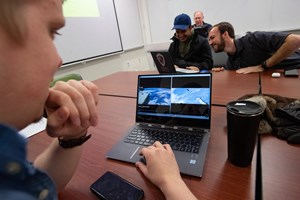
Breaking the silence
Tucked away in the UNITE Mission Operations Center in the lower level of the Business and Engineering Center, a handful of USI students and professors quietly watch and wait, eyes glued to laptops and a large projector screen, for a moment two and a half years in the making. Then, at 7:40 a.m. on Thursday, January 31, a single word from Mission Control breaks the silence— “deployment.”
Amid the cheers and applause as the UNITE CubeSat shoots from the International Space Station, Zack Snyder’s hands shoot to his face. “Oh, that’s awesome,” the senior computer science major murmurs in amazement, transfixed by the view and, perhaps, by the magnitude of what he and 14 peers made possible. “There’s been a lot of anticipation for this day,” he says.
Overwhelmed
Not even Snyder has experienced the level of anticipation endured by his CubeSat teammate, Ryan Loehrlein. “It was kind of an overwhelming feeling seeing it ejected out of the ISS. It’s almost too hard to put into words,” says Loehrlein, mechanical engineering and finance, one of two students involved in the project from its start. “We were just waiting for the buildup when it finally deployed,” adds Snyder, “and then afterwards we had to wait again to get our first contact with it.”
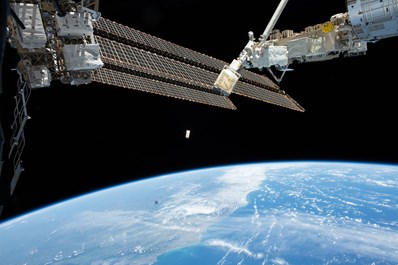 That contact happened less than an hour later when the satellite transmitted its first data (signaling, in part, strong battery power) while over the South Pacific. “When we got that, it was just overwhelming relief,” Snyder recalls. “Now we’re just waiting for more data to come through.” Snyder, Loehrlein and their teammates, along with advisor Dr. Glen Kissel, associate professor of engineering, expect information to continue pouring in every few hours. “We’re going to be checking our phones a lot in the next few weeks, for sure,” says Snyder, with a laugh. (Another batch of data did arrive a few hours later. The photo to the left shows the satellite being deployed, courtesy of NASA and NanoRacks.)
That contact happened less than an hour later when the satellite transmitted its first data (signaling, in part, strong battery power) while over the South Pacific. “When we got that, it was just overwhelming relief,” Snyder recalls. “Now we’re just waiting for more data to come through.” Snyder, Loehrlein and their teammates, along with advisor Dr. Glen Kissel, associate professor of engineering, expect information to continue pouring in every few hours. “We’re going to be checking our phones a lot in the next few weeks, for sure,” says Snyder, with a laugh. (Another batch of data did arrive a few hours later. The photo to the left shows the satellite being deployed, courtesy of NASA and NanoRacks.)
During its expected 15 months in orbit, the satellite, launched to the ISS for deployment aboard a SpaceX Dragon Capsule on December 7, 2018, will focus on three main missions: to measure plasma levels in the lower ionosphere, record its own internal and exterior temperatures and measure its orbital decay as it reenters the Earth’s atmosphere at the end of its mission. But the first step for the team, Kissel says, is to distinguish its orbit from that of four other CubeSats deployed at the same time.
Beating the odds
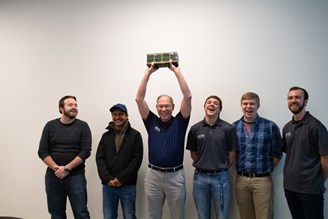 While deployment was a milestone, it’s far from the end of UNITE’s space odyssey. Kissel says 25 percent of CubeSats are dead upon deployment. “At least we beat that first odd,” offers Loehrlein. Of those that survive, “some CubeSats only last two days, others only last two weeks. We need it to last 15 months,” Kissel says. “Any data that we collect is scientific data, but our main data is toward the end of the mission, so hopefully we last the entire time,” adds Loehrlein.
While deployment was a milestone, it’s far from the end of UNITE’s space odyssey. Kissel says 25 percent of CubeSats are dead upon deployment. “At least we beat that first odd,” offers Loehrlein. Of those that survive, “some CubeSats only last two days, others only last two weeks. We need it to last 15 months,” Kissel says. “Any data that we collect is scientific data, but our main data is toward the end of the mission, so hopefully we last the entire time,” adds Loehrlein.
A new world
If the satellite does its job, Loehrlein and Snyder will have to watch the project reach completion from a distance. By then, they’ll be USI graduates like several of the original team members. “It’s kind of sad leaving the project,” Loehrlein admits, “but at the same time, we’re ready to pass it on to other capable students.” He and Snyder do so knowing they helped make history—as the first higher education institution in Indiana to create a deployed satellite. “Most undergraduate students never even get an experience like this, so being able to come to a public institution in Indiana, it’s phenomenal that USI has this opportunity,” he says.
No one, not even the CubeSat team, knows exactly what the small satellite will uncover. But Loehrlein and Snyder do know the process of creating it has changed their lives.
“I think we both really got excited about the space program,” says Snyder. “We got to tour a lot of space facilities as part of this project, and we were giving presentations to NASA, so I think all of us have a little bit of our eye on the space program going forward. It’s opened up a whole new world for us."
UNITE CubeSAT Multimedia
Watch the UNITE CubeSat’s deployment (courtesy of NASA/NanoRacks) and the UNITE CubeSat team’s reaction to the deployment.
See a slideshow of the UNITE CubeSat team during the satellite’s deployment from the International Space Station.
See more photos of the CubeSat team in action.
Read more about the CubeSat team and project in this feature story from the fall 2017 issue of illume magazine.
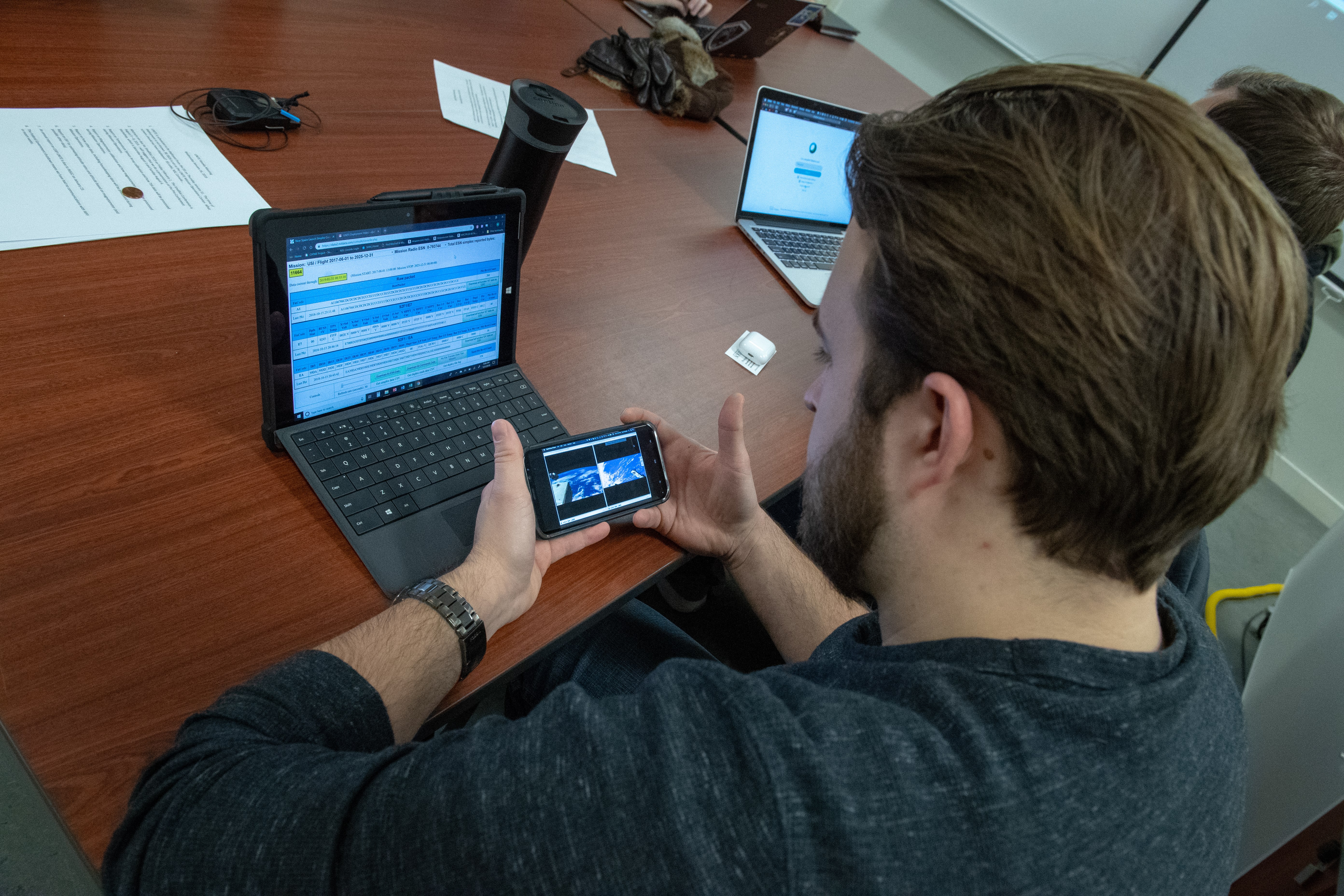 UNITE CubeSat Quick Facts
UNITE CubeSat Quick Facts
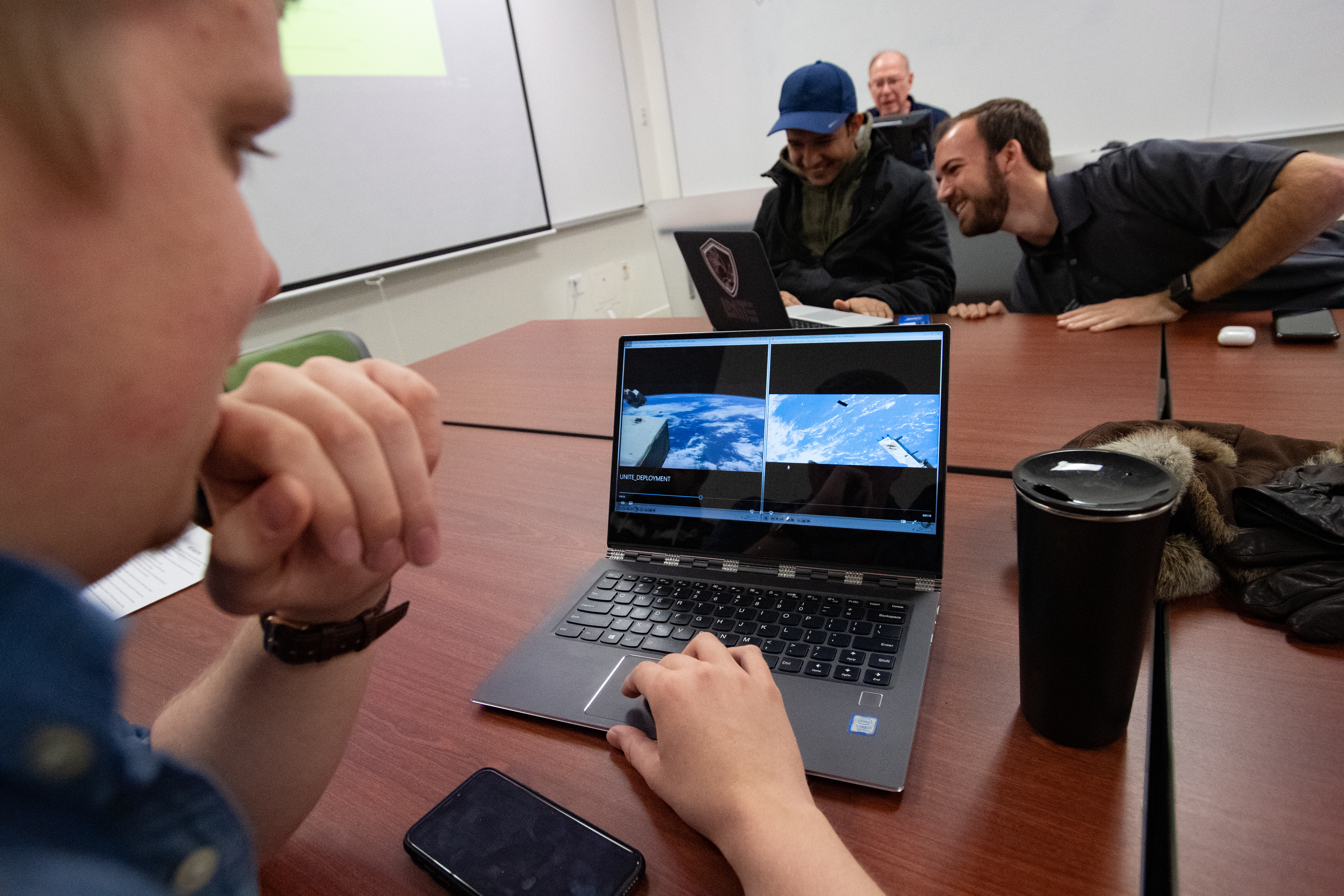
Photo Credit: USI Photography and Multimedia
Members of USI's UNITE CubeSat team watch as their satellite is deployed from the International Space Station on Thursday, January 31, 2019.